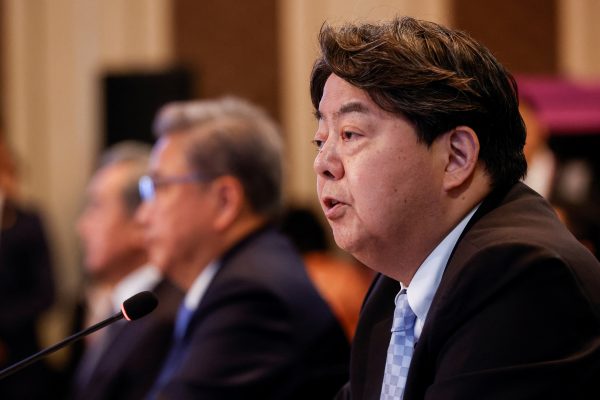The question is how these foundations fit the present relationship. The 50th anniversary of the ASEAN–Japan dialogue underscores the strong ties that have been built in the intervening decades. But a fast-evolving, multiplex world order, with new centres of power and increasingly complex interactions, poses a number of challenges to the relationship going forward.
Intense geopolitical rivalry between the United States and China presents unprecedented challenges for ASEAN, and Japan will need to cooperate with heightened awareness and strategic acumen to address these challenges. The relationship with Japan is also a key element in the environment in which ASEAN will have to navigate the strategic dilemma between the United States and China.
Navigating the balance between China and the United States is crucial for maintaining regional stability and upholding ASEAN’s shared principles of openness and inclusivity. As Japan tilts towards its US alliance, balancing competing interests, avoiding ASEAN’s overreliance on any single power and preserving centrality and strategic autonomy will require continuing and deft diplomatic initiative.
Managing these complexities through dialogue, trust-building and a focus on shared interests is key. Addressing challenges to the ASEAN–Japan relationship, like regional power dynamics, territorial disputes, economic competition and historical tensions will be essential for fostering a more resilient and cooperative partnership.
Japan’s commitment to regional security and engagement in multilateral frameworks provides avenues for closer collaboration with ASEAN, under the framework of the East Asia Summit, the ASEAN Regional Forum, the ASEAN Defence Ministers’ Meeting Plus and the ASEAN Expanded Maritime Forum. But Japan’s involvement in security minilaterals such as the Quad—which China views as a containment strategy—does not sit comfortably with ASEAN.
Compatibility between Japan’s Free and Open Indo-Pacific and the ASEAN Outlook on the Indo-Pacific lies in their shared objectives and overlapping principles. Both emphasise a rules-based international order, respect for sovereignty and the promotion of connectivity and economic integration. Through mutual collaboration, these initiatives have the potential to contribute significantly to peace, stability and economic development in the Asia-Pacific region, but how these agendas evolve, are defined and made operational is still a work in progress.
The sharing of intelligence, expertise and best practice has enabled a more comprehensive approach to countering radicalisation, preventing terrorist financing and enhancing border security. By pooling resources and knowledge, Japan and ASEAN have bolstered their respective counterterrorism capabilities and contributed to regional stability. In 2014, ASEAN and Japan adopted a Joint Declaration for Cooperation to Combat Terrorism and Transnational Crime to strengthen cooperation in this area.
Given the importance of maritime domains in the region, ensuring security and freedom of navigation has been an area of collaboration between Japan and ASEAN. Japan actively supports ASEAN member states in enhancing their maritime capabilities, providing assistance in areas such as maritime domain awareness, capacity building, joint exercises and equipment.
Since the 1970s Japan has supplied surveillance ships to nations within ASEAN, including Vietnam and Indonesia. It has also financially supported various initiatives aimed at enhancing the capabilities of ASEAN nations to prevent and counteract unlawful fishing activities. In 2017, Japan entered into a collaborative agreement with Thailand, focusing on combating illegal, unreported and unregulated fishing. This agreement emphasised improving the traceability of fishery products and bolstering efforts in monitoring, controlling and overseeing fishing operations.
With Japan and several ASEAN countries prone to natural disasters, sharing expertise and resources in disaster response and recovery is another significant area of collaboration. Japan’s experience with disaster preparedness, early warning systems and post-disaster reconstruction is instrumental in assisting ASEAN member states with capacity building to mitigate the impact of natural disasters. This cooperation has not only saved lives but also promoted regional solidarity and cooperation in times of crisis.
Economic ties between ASEAN and Japan have flourished over the years, with Japan remaining one of ASEAN’s largest trading partners and a major source of foreign direct investment (FDI). FDI outflows from Japan to ASEAN ammounted to around US$20 billion and bilateral trade reached US$240.2 billion in 2022. ASEAN is home to 30 per cent of all Japanese overseas subsidiaries. The ASEAN–Japan Comprehensive Economic Partnership has facilitated trade liberalisation, market access and economic integration. Infrastructure development, such as the Partnership for Quality Infrastructure, also received active support from Japan, contributing to ASEAN’s connectivity goals.
ASEAN and Japan can focus on enhancing physical and digital connectivity, promoting trade facilitation, strengthening regional supply chains and addressing climate change and sustainable development. Continued support from Japan is crucial to ensure inclusive growth and bridge development disparities among ASEAN member states. The Japan–ASEAN Integration Fund, established in 2006, and Japan–Mekong Cooperation, founded in 2008, are the two such mechanisms established to assist the least developed economies in ASEAN.
Deepening people-to-people ties through cultural exchanges, educational programs and tourism will further foster mutual understanding and friendship. Strengthening educational cooperation and providing reciprocal scholarships for students from Japan and ASEAN nations will also contribute to long-term relationship building.
ASEAN and Japan need to continue working closely together to strengthen open and inclusive multilateralism, promoting a rules-based international order and leveraging opportunities for economic integration, security cooperation and people-to-people exchanges. In this way, ASEAN and Japan can navigate the challenges and build a stronger and more sustainable relationship in the years to come.
Vannarith Chheang is Lecturer in Public Policy and Global Affairs at Nanyang Technological University and President of the Asian Vision Institute.
This article appears in the most recent edition of East Asia Forum Quarterly, ‘ASEAN and Japan,’ Vol 15, No 3.

